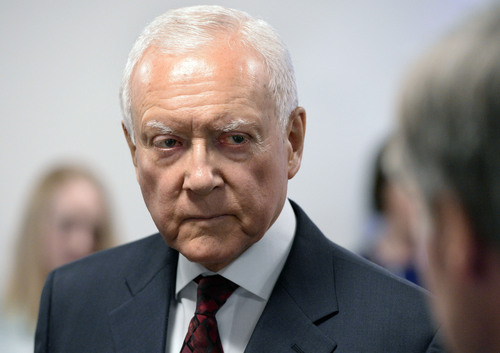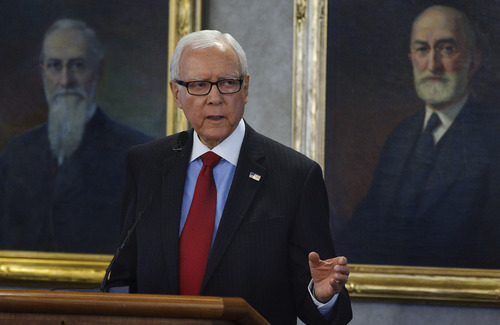This is an archived article that was published on sltrib.com in 2014, and information in the article may be outdated. It is provided only for personal research purposes and may not be reprinted.
With the stroke of a pen Monday, President Barack Obama barred federal contractors from discriminating against LGBT workers.
Gay-rights groups heralded the executive order as a historic advancement, but others, including Sen. Orrin Hatch, R-Utah, criticized Obama for not carving out contractors tied to a religion.
Obama signed the order, in part, because a nondiscrimination bill has been stymied in Congress.
"I'm going to do what I can, with the authority I have, to act," Obama said moments before signing the measure, which also expanded federal workplace protections on the basis of gender identity.
The Democratic president said it isn't hyperbole to say some lesbian, gay, bisexual and transgender employees have lost their jobs because of their sexual orientation.
"This is not speculative. This is not a matter of political correctness," Obama said. "Their livelihoods are threatened, their families are threatened. In fact, more states now allow same-sex marriage than prohibit discrimination against LGBT workers. So I firmly believe that it's time to address this injustice for every American."
Utah is one of the states without a law barring workplace discrimination against LGBT people. A bill, sponsored by state Sen. Stephen Urquhart, R-St. George, never came up for a vote in the 2014 session. A Salt Lake Tribune survey conducted earlier this year showed 60 percent of Utahns favored that workplace-protection bill.
That proposal will be back in 2015, but Utah Senate President Wayne Niederhauser, R-Sandy, said it is too early to predict its outcome.
"There are a number of legislators who want to address religious liberties," he said. "It may be time to have a robust debate on both issues."
About 20 local governments statewide have passed their own anti-discrimination ordinances, including Salt Lake City, which did so with the blessing of The Church of Jesus Christ of Latter-day Saints.
"It is wrong to fire someone for who they are and who they love," said Clifford Rosky, chairman of the Equality Utah board and a law professor at the University of Utah. "It's now high time for our Legislature to act on values that all Utahns share and protect all Utahns."
Hatch supported a federal nondiscrimination law, but hinged his vote on a strong religious exemption. That bill cleared the Senate, but the House has no plans to vote on it.
Hatch argues that Obama should have included a wider exemption in his executive order, similar to the one in the Senate bill.
"Respect for the free exercise of religion is essential to our character as a nation and has, until recently, enjoyed strong support from leaders of all political persuasions," Hatch said. "In seeking to curtail unjust discrimination on the basis of sexual orientation, we must ensure that legal protections do not trample upon basic religious liberties."
His position echoed what the White House heard from dozens of religious leaders and educators, who sent letters asking for a beefed-up exemption.
"While the nation has undergone incredible social and legal change over the last decade, we still live in a nation with different beliefs about sexuality," one letter said. "We must find a way to respect diversity of opinion on this issue in a way that respects the dignity of all parties to the best of our ability."
Some Catholic charities have federal contracts to perform social services, though they may also fall under a limited exemption identified during the administration of President George W. Bush that allows religiously affiliated contractors to favor employees of that faith. It is not immediately clear if the new executive order will affect any Utah-based federal contractors.
LDS Church-owned Brigham Young University says it has about 50 federal contracts, most of which support faculty research, that may fall under Obama's executive order.
"At this point, it would be premature to say for sure how this will play out for federal contracts awarded to universities like BYU," said Todd Hollingshead, a spokesman for the Provo school. "We'll know more when the federal government issues rules to guide the interpretation of this executive order."
Asked for comment on the executive order, LDS Church spokesman Dale Jones released a statement saying, "Religious freedom is critical to the health of a diverse society and church leaders have long maintained the importance of its preservation."
A collection of gay-rights groups, including the Human Rights Campaign, has fought against a religious exemption and backed off its support of the Senate bill for fear that it would be easy for companies to claim a moral objection.
Rosky believes an exemption would be "totally inappropriate."
"Religion cannot be used," he said, "as an excuse to justify discrimination against gay and transgender individuals."





